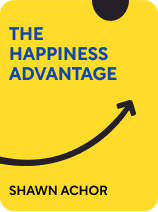

This article is an excerpt from the Shortform book guide to "The Happiness Advantage" by Shawn Achor. Shortform has the world's best summaries and analyses of books you should be reading.
Like this article? Sign up for a free trial here .
Do you want to know how to develop good habits? What can you do to improve your willpower?
If you want to develop good habits, the key is to improve your willpower—this will allow you to remain disciplined and motivated. In The Happiness Advantage, Shawn Achor shares four strategies to increase your chance of successfully creating a habit.
Find out how to develop good habits below.
Developing Good Habits
There’s no use in knowing that you should do something if you don’t actually do it—but having the knowledge doesn’t make it any easier to develop good habits. For example, you probably know that you should eat fruits and vegetables every day, and that you should get eight hours of sleep each night, but do you always follow that advice? In this chapter, we’ll explain why you don’t always do the things you should, how to stop your unhealthy habits, and how to implement healthy ones.
A major factor preventing you from doing all the things you should do is willpower—or lack thereof. People have limited willpower, and they only have one source of it, meaning that you don’t have a bucket of work-related willpower as well as a bucket of personal willpower. Throughout the day, small acts like avoiding a donut in the break room and staying focused during a long, tedious work meeting tax your willpower, so you may not have any left at the end of the day when you get home and you have to choose between a burger and a salad for dinner.
One study highlighted people’s finite willpower by telling participants not to eat for three hours before the experiment began, then putting both cookies and radishes in front of them. The first group was told to eat only the radishes and the second group was told to eat whatever they wanted (a third control group was given no food). Afterwards, the groups were asked to complete an unsolvable geometric puzzle that they were told was supposed to be simple. The second and control groups toiled over the puzzle substantially longer than members of the first group, who had already used all of their willpower and mental energy resisting the cookies—they had no will to persist on a tricky puzzle.
Marketing campaigns exploit people’s limited willpower with opt-outs. For example, when you’re placed on a mailing list by default or offered the first month of a subscription service free—all you have to do is unsubscribe, but these tactics assume that most people will never get around to making that effort. This is also why companies push to get their products placed at hand level in grocery and clothing stores, because customers are far more inclined to buy something if they don’t have to reach up or bend down to get it. The barrier doesn’t have to be large to be effective.
Willpower is like a pump pushing water uphill—but the pump has a limited power supply, and when it runs out, the water begins to flow downstream along the path of least resistance. Similarly, when your willpower wears thin, your behavior naturally returns to the easiest and most familiar patterns: your habits. As such, having willpower is crucial if you want to develop good habits.
How to Develop Good Habits
Habits are actions that you perform so often that they become almost automatic. Every time you perform an activity, it sparks a connection between certain brain cells, called neurons. The more frequently you do that action, the stronger the connection becomes, and the more quickly information flows between those neurons. Eventually, certain activities become so ingrained in your neural networks that you don’t have to consciously think about them, and they don’t tap your willpower; these are habits. For example, when you brush your teeth each morning, you don’t have to consciously remember that you’re supposed to brush daily, or think about the steps you have to take (such as grabbing the toothbrush and squeezing the toothpaste) and in what order. Brushing your teeth is such a strong habit that it requires no thought or willpower.
Since you can’t always rely on willpower to help you to make good choices, turn healthy behaviors into habits. When you’ve chosen a behavior that you want to turn into a habit, do it regularly and frequently. The early stages require the most diligence and willpower, because you’re still in the process of ingraining the action to make it a habit. Try these strategies to increase your chance of successfully creating a habit:
1) Minimize the activation energy required to do the action. Activation energy is the motivation and momentum required to actually do an activity. For example, if you’re trying to make a habit of playing the guitar daily, minimize the effort required to get the guitar out and ready to play. Instead of storing the guitar in the closet, keep it on a stand in the middle of the room, where it’s both in plain view and within reach.
2) Implement a 20-second rule to lower the barriers to good habits. If the activation energy takes 20 seconds or more in order to do your new habit, change something (like relocating the guitar). Although 20 seconds is not much, when your willpower is low, even minimal activation energy can be enough to deter you and derail your habit formation. You can adjust the time for your own rule—perhaps a 10-second rule or a 30-second rule is better for you. Regardless of the details, look for ways to eliminate as many barriers as possible.
3) Increase the activation energy required to do bad habits—you can even flip the 20-second rule to increase the barriers to doing undesirable behaviors. For example, if you want to cut down on the amount of TV you watch, take the batteries out of your remote and put them in a drawer that’s at least a 20-second walk from the couch.
One businessman sought Achor’s help because he felt was working long hours but accomplishing very little. It became apparent that he was spending a surprising amount of time checking emails, the stock ticker, and news headlines and doing little work in between. To resolve this, he made it more difficult to access these distractions: He placed the app icons for email, stocks, and news in folders within folders within folders, preventing him from frequently and mindlessly tapping the apps. He also changed his settings so that he had to sign in every time he checked his email. Now his environment was primed for productivity rather than for distraction—he could still check the apps, but he would have to opt in.
4) Create rules that support your habit formation. These rules will determine your second-order decisions, which are the decisions you make regarding the details of the action. For example, if you’re trying to create a habit of exercising first thing in the morning, make rules about what time you’ll get up, whether you’ll run or go to the gym, and how long you’ll exercise. Every decision you make throughout the day—including minor decisions like these—wear down your willpower, physical stamina, ability to focus, tenacity, and mental agility. Setting rules saves you from having to make secondary decisions, which preserves your willpower and gives you less wiggle room to stray from your commitment.
Exercise: What Positive Habit Will You Form?
Develop good habits with the following exercise:
- What is one positive habit you want to start (for example, writing in your journal every day)?
- How can you reduce the activation energy to less than 20 seconds (for example, keep your journal and a pen on your bedside table)?
- List one or two rules you can implement to support your habit.
- What is the counterproductive bad habit that impedes you from doing this positive habit? Or what is a different bad habit that you want to stop doing?
- How can you increase the activation to that habit to be more than 20 seconds?

———End of Preview———
Like what you just read? Read the rest of the world's best book summary and analysis of Shawn Achor's "The Happiness Advantage" at Shortform .
Here's what you'll find in our full The Happiness Advantage summary :
- How happiness isn’t the result of success, it’s the cause of it
- The benefits of happiness—from increased creativity to improved health
- Strategies for adopting a positive mindset and raising your happiness baseline






